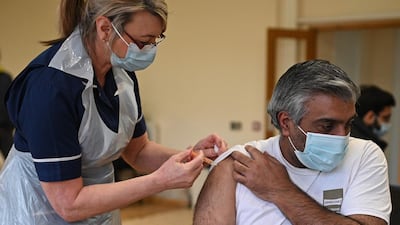A celebrity advertising campaign is striving to counter hesitancy among some ethnic minorities that is affecting Britain's impressive vaccine introduction.
But experts say such campaigns must overcome mistrust of the government among black and South Asian people, who have been dying in disproportionate numbers from Covid-19 but are scarred by endemic racism and past drugs scandals.
Coronavirus vaccines do not contain pork or make you infertile:
"This isn't about blaming individuals," said Dr Nikita Kanani, medical director of primary care for England's National Health Service.
Dr Kanani told a briefing organised by the British Asian Trust to encourage vaccination that a lack of trust goes back "centuries" in some communities, with "traumatic" experiences such as inappropriate testing of drugs on black people.
"What we want to do, what we need to do, is move past that to make sure people get the vaccine," she said.
The government has been working with faith and community leaders, establishing vaccination centres at mosques, temples and gurdwaras.
Imams are counselling Muslims that taking a vaccine does not breach the fasting month of Ramadan, which starts in mid-April.
Both Muslims and Jews have been assured the doses do not contain pork, or foetal stem cells.
Initiatives include a new TV campaign featuring well-known black and South Asian celebrities.
One notes that the Pfizer-BioNTech vaccine was developed by a German-Turkish Muslim couple.
That vaccine and another developed by the University of Oxford and AstraZeneca are just as safe for ethnic minorities as for white people, the campaign stresses.
"There is no chip or tracker in the vaccine to keep watching where you go," comedian and TV presenter Romesh Ranganathan says.
"Your mobile phone actually does a much better job of that."
About 86 per cent of the UK population is white, and acceptance of the vaccines since the world's first inoculation campaign was launched in December is running at about 90 per cent.
The government plans to offer a first dose to every adult by the end of July. But isolated Covid-19 hotspots could persist if hesitancy lingers among certain demographics.
The infection rate among the Hasidic Jewish community in London's Stamford Hill area was 64 per cent in early December, one of the highest rates recorded in the world, according to the London School of Hygiene and Tropical Medicine.
Dr John Edmunds, an epidemiologist from the school and expert adviser to the government, said the accelerating drive could hide the virus among "harder to reach groups".
That raised the risk of future mutations, "which could reduce the effectiveness of the vaccination programme", Dr Edmunds told the BBC on Sunday.
Figures from OpenSafely, a database run by the London school and Oxford, showed that vaccinations by early February among Bangladeshi and Pakistani communities stood at just 59 per cent.
Among people of African heritage, it was less than 49 per cent, although later data suggests the gap has narrowed slightly.
Britain's largest black African population is from Nigeria, where anger remains over the deaths of 11 children in 1996 after they were administered an experimental meningitis vaccine by Pfizer.
"We have to be honest and admit that there have been reasons why there has been mistrust between the black community and healthcare systems," Prof Toyin Falusi Nwafor told the Nigerian faithful of North London's Jesus House church, in a YouTube seminar.
The doctor, who lives in the US, spoke of the Tuskegee experiment, where government scientists monitored African-American men with syphilis for 40 years without giving them treatment.
In Britain, as in the US, ethnic minorities are disproportionately in lower-paid jobs and overcrowded housing, and have more health conditions such as diabetes, all of which make them more vulnerable to Covid-19.
Black British men are nearly three times more likely to die of the virus than white men, the Office for National Statistics says.
Mortality rates among people of Bangladeshi ethnicity are twice as high.
There are persistent complaints among some minorities that their concerns are not taken seriously by white medics.
Black women are five times more likely to die in childbirth than white women in NHS hospitals, and more than 60 per cent of black people do not believe their health is equally protected, a cross-party parliamentary report said in November.
Prime Minister Boris Johnson "doesn't need to turn up at every mosque or synagogue in Britain, but his government could acknowledge the rationality of some of these concerns", said Agnes Arnold-Forster, a healthcare historian at Bristol University who has studied vaccination campaigns.
"If you feel like you've been failed by the state time and time again, it's not hugely surprising if you don't have a huge amount of faith in state-backed initiatives like the rollout," Ms Arnold-Forster told AFP.


